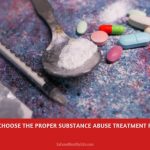
Image Source: FreePik
Addiction is an illness that doesn’t discriminate. People from all backgrounds are at risk of developing an addiction, even those who have been prescribed medications by their physician. Whatever the reason a person starts using drugs, they are very likely to develop a tolerance and ultimately dependence if they continue. Addiction takes time to develop and often people become dependent on substances without even realizing.
It is always extremely beneficial for individuals to seek treatment as soon as possible for substance abuse although they are often unable to see the warning signs. This is the reason families of people abusing drugs and alcohol increasingly enlist the services of an alcohol and drug intervention specialist.
When someone has become addicted, it can be very difficult for them to stop using without treatment in drug and alcohol rehabilitation centers. This is mainly because of the extensive effects drugs have on the brain and body which leaves the individual with impaired physical, emotional and psychological health. As soon as it becomes clear an individual has a problem with drugs, it is important for them to get help in a drug and alcohol rehabilitation center as soon as possible. Many substances today carry a high risk of fatal overdose, and so time is of the essence when seeking help from a center for alcohol and drug treatment.
Abusing most substances will create noticeable warning signs which can be either physical or behavioral and often both.
Physical Symptoms
One of the most obvious symptoms of drug abuse for the person using them is that they will gradually need to take more to get the same effects. This is called ‘tolerance’ and it means that the body has become used to receiving the drug on a regular basis and so it has adapted to its effects. The user will recognize this when they start to experience withdrawal at progressively shorter periods of time after using.
Tolerance is generally a key factor in an individual developing dependence on drugs. The way the body ‘asks’ for more is by making the person feel really unwell. With alcohol, this is referred to as a hangover although the flu-like symptoms are very similar for withdrawal from other substances too. This creates a problem because withdrawal symptoms can become extremely unpleasant which often leads to the person using to reduce them unless they enter a center for drug and alcohol treatment.
Another clue of substance abuse is in changes to the individual’s appearance including:
- Bloodshot eyes
- Dilated or constricted pupils
- Fluctuations in body weight
- Difficulty sleeping
- Sleeping too much
Behavioral Symptoms
Because of the mind-altering nature of drugs, users tend to behave in ways that are out of character. The way drugs work is by affecting the brain’s neurotransmitters which flood the body with pleasant sensations. Over time and with prolonged use, significant neurological damage can be done unless the person enters a drug and alcohol rehabilitation center. When the brain’s function has become damaged as a result of substance abuse, it has a wider effect on the person that affects the way they behave. They may not be able to focus or think logically and will have delayed responses to all types of stimulus.
Changes in behavior that indicate a person is abusing substances include the following:
- Extreme mood swings
- Irritability and restlessness
- Changes in personality
- Lethargy and sluggishness
- Depression and anxiety
- Changes in social activity
- A shift in personal priorities
- Risk-taking behavior such as driving under the influence
Getting Help for Substance Abuse
We have a much better understanding of addiction today and there are now several approaches for a person seeking to overcome substance abuse. For those with religious beliefs, the traditional 12 step model is most likely to resonate but for others, a secular or holistic approach may be more appropriate. Ultimately, there is no one-size-fits-all approach to healing addiction although this is a positive thing because no two individuals struggling with the illness have the same needs.
At Elevate, we offer personalized programs that are devised after considerable assessment and evaluation. It is important to get the complete picture of a person’s substance abuse issues which involves identifying the root causes and addressing them. We integrate holistic therapies with conventional methods for treating addiction to find the best way forward for people entering an Elevate drug and alcohol rehabilitation center, which can easily be incorporated into daily life in recovery.
About The Author:
Mike is a health editor with a degree in Journalism and Social Communications, currently writing for several USA & UK publications. He is specialized in articles around health tips, workout plans, and other nutrition-related topics. His main aim is to help health charities to raise awareness on campaigns about misunderstood or commonly misdiagnosed conditions.




